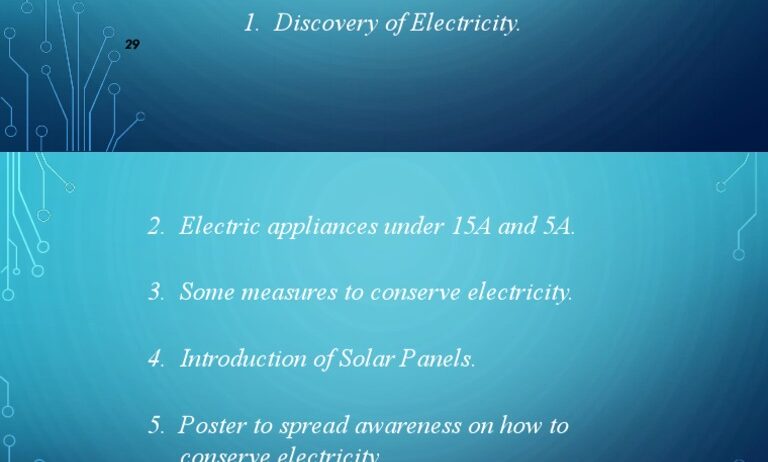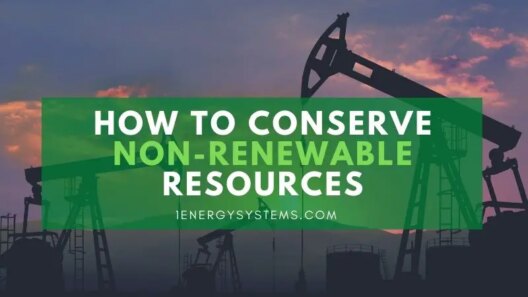Electrical energy conservation can be likened to the act of nurturing a fragile seedling into a towering oak tree. It is an intricate dance between using what we have judiciously and fostering an environment where sustainable practices can thrive. As society marches into the future, understanding the significance of conserving electrical energy is not merely a necessity, but a responsibility that resonates with every individual.
The essence of electrical energy conservation lies in the principle of utilizing energy judiciously, minimizing waste while satisfying our modern-day demands. Like an orchestra, where each musician must play harmoniously to produce a captivating symphony, our collective efforts to conserve electrical energy can create a more sustainable and balanced ecosystem. In essence, conserving energy is about being cognizant of our usage patterns, making small adjustments to our daily habits, and employing efficiency-enhancing technologies.
In this age of rampant consumption, the metaphor of a bottomless well resonates deeply. Initially, the well seems infinite; however, when one bypasses the constraints of water usage, it soon runs dry. Similarly, our electrical resources are not limitless. The reckless consumption of energy not only depletes reserves but also engenders dire repercussions for our environment. By adopting energy conservation techniques, we can ensure that this metaphorical well continues to flow for future generations.
At its core, electrical energy conservation encompasses various strategies and methodologies aimed at reducing energy consumption without compromising the quality of life. To embark on this journey, we must first reassess our relationship with energy. This begins with the implementation of energy-efficient technologies, such as LED lighting, energy-efficient appliances, and smart-home systems that adapt to our lifestyles. Imagine an intelligent home that learns when to dim the lights or reduce heating based on occupancy. Such innovations epitomize the delicate balance between convenience and conservation.
Next, it is essential to cultivate an awareness of the everyday choices that contribute to our energy footprint. Simple actions, such as turning off appliances when not in use, using natural light during the day, and optimizing heating and cooling systems, can cumulatively yield substantial savings. Engaging in these practices is akin to creating a mosaic; each piece, though small, contributes to a larger picture of sustainability and conscientious living.
One cannot overlook the educational aspect of energy conservation. Like lanterns illuminating dark pathways, knowledge serves as a guide for individuals and communities seeking to make informed choices. Awareness campaigns and educational programs play a pivotal role in fostering a culture of conservation. By disseminating information on the benefits of energy efficiency and the consequences of excessive consumption, we empower individuals to become stewards of the environment.
The impact of electrical energy conservation extends far beyond mere monetary savings. It is an act of kindness towards our planet—a commitment to preserving its resources for future generations. The reduction of energy consumption translates into diminished greenhouse gas emissions, contributing to the amelioration of climate change. Just as ripples in a pond extend outward from the point of contact, our efforts to conserve energy can create widespread change, affecting global health and ecological stability.
Moreover, energy conservation is a catalyst for innovation. As society seeks to reduce its reliance on traditional energy sources, new technologies emerge that challenge the status quo. Renewable energy sources, such as solar and wind, are becoming increasingly accessible and affordable, transforming the landscape of energy consumption. In this context, conservation acts as a bridge, connecting the present with a sustainable future powered by clean energy.
Government policies and regulations also play an instrumental role in promoting electrical energy conservation. Incentives for businesses and individuals to adopt energy-efficient practices foster an environment conducive to innovation and responsibility. By legislating energy efficiency standards and promoting research and development in renewable technologies, authorities can steer the collective consciousness towards a more sustainable trajectory.
The call for conservation is not simply a plea; it is a clarion call for a paradigm shift. As the world grapples with environmental crises and resource scarcity, the imperative for electrical energy conservation becomes increasingly urgent. The metaphorical ship of human progress must pivot away from unsustainable consumption patterns or risk capsizing in the turbulent waters of climate change and depletion of resources.
In conclusion, electrical energy conservation represents a confluence of individual responsibility, technological advancement, and collective action. By nurturing our resources as one would a sapling, we can cultivate a thriving environment for generations to come. As we navigate this vital journey towards sustainability, let us embrace the power of conservation, for within it lies the promise of a brighter, more sustainable future. The choice is ours, and the time is now. In the tapestry of existence, every thread matters. Let us weave together a narrative of conservation that resonates far beyond our immediate surroundings, setting the stage for a world where harmony prevails, and the vibrancy of life flourishes.








